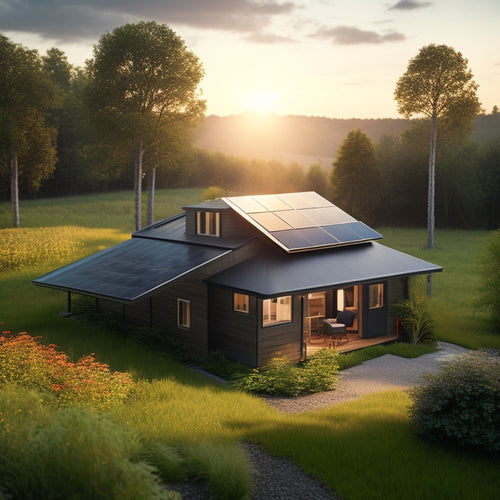
Why Top Brands Vary in Panel System Costs
Share
You pay a premium for a panel system from one top brand over another due to variations in technology, materials, and manufacturing processes that impact the final cost. High-efficiency solutions, durable materials, and optimized production efficiency all influence pricing. Furthermore, warranty duration, support options, and installation logistics, including labor costs and site preparation, also contribute to the difference in costs. Certifications and compliance fees, such as UL certification or CE marking, further add to the price variation. As you investigate the factors driving these discrepancies, you'll uncover the subtleties that separate top brands and their panel system costs.
Overview
- Differing technologies and materials used by top brands, such as advanced framing and MPPT technology, impact panel system costs.
- Manufacturing process efficiency and scale of production influence pricing, with larger manufacturers benefiting from economies of scale.
- Warranty and support offerings, including duration and scope, vary among top brands and affect total cost of ownership.
- Installation and logistics costs, including site preparation and labor expenses, differ depending on complexity and location.
- Certification and compliance fees, such as UL certification and CE marking, add to the overall cost of panel systems.
Differing Technology and Materials
When evaluating panel systems, differing technology and materials can greatly impact costs.
You'll notice that various brands employ distinct technologies, such as advanced framing, structural insulated panels, or modular construction. These technology advancements markedly influence the final price.
For instance, high-efficiency solutions that maximize energy harvest, utilizing advanced MPPT technology, can increase upfront costs but provide long-term benefits.
Additionally, material durability plays an essential role in determining costs. For instance, using high-quality, durable materials like fiberglass or steel can increase upfront costs but reduce maintenance expenses in the long run.
On the other hand, opting for lower-cost materials may lead to higher expenses down the line.
Manufacturing Process and Scale
As you weigh the costs of panel systems, the manufacturing process and scale come into play, building upon the material and technology considerations. A company's production efficiency can greatly impact its pricing. Those with optimized manufacturing processes can reduce costs and pass the savings on to you. Additionally, the scale of production can influence pricing, as larger manufacturers can take advantage of economies of scale.
| Manufacturing Process | Scale | Impact on Cost |
|---|---|---|
| Highly automated | Large | Lower costs due to efficiency and economies of scale |
| Semi-automated | Medium | Moderate costs, balancing efficiency and manual labor |
| Manual | Small | Higher costs due to labor-intensive process and limited scale |
| Lean manufacturing | Large | Lower costs through optimized processes and supply chain |
| Traditional manufacturing | Medium | Moderate costs, with room for improvement in efficiency and scale |
Warranty and Support Offerings
You'll also need to evaluate the warranty and support provisions of a panel system, which can greatly influence its overall cost. When comparing top brands, consider the warranty duration, as it directly impacts the total cost of ownership. A longer warranty period typically translates to higher upfront costs, but it can provide peace of mind and protection against unforeseen repairs.
Additionally, assess the support responsiveness of each brand, as timely and effective issue resolution can minimize downtime and reduce overall expenses. It's crucial to research the manufacturer's reputation panel durability and customer reviews to guarantee quality and reliability.
Look for brands that offer extensive support packages, including dedicated hotline services, online resources, and on-site maintenance options. By evaluating these factors, you can make an informed decision about which panel system best aligns with your needs and budget.
Installation and Logistics Costs
Kick-starting the installation process involves factoring in the costs associated with getting your panel system up and running.
You'll need to take into account site preparation costs, which can vary depending on the complexity of the installation site. This may include clearing land, excavating, or preparing the ground for the panel system's foundation.
System compatibility and integration are vital to prevent downtime and guarantee reliable performance, and this should be evaluated during the installation process.
Labor expenses are another significant factor, as they can account for a substantial portion of your overall installation costs. The cost of labor will depend on the complexity of the installation, the experience level of the installers, and the local labor rates.
Certifications and Compliance Fees
Certifications and Compliance Fees
You're likely aware that panel systems must meet specific regulatory requirements to guarantee safety and performance. To achieve this, manufacturers undergo certification processes, which come with associated fees.
These fees vary depending on the type of certification, testing requirements, and geographical region. For instance, UL certification in the US or CE marking in the EU may require different testing and documentation, resulting in different costs.
Compliance fees can also include costs for auditing, documentation, and labeling. When comparing panel system costs from top brands, it's crucial to factor in these certification and compliance fees, as they can greatly influence the overall price.
Frequently Asked Questions
How Do I Determine the Best Panel System for My Specific Needs?
You'll determine the best panel system for your specific needs by conducting a thorough cost analysis, comparing top brands' features and warranties, and evaluating factors like energy output, durability, and installation requirements to find the ideal fit.
Are Panel Systems Suitable for Residential or Commercial Use Only?
You're the expert builder, constructing your ideal setup, and wondering if panel systems are the perfect brick for your residential or commercial structure. Fortunately, they're versatile, offering benefits in both domains, with residential applications prioritizing efficiency and commercial advantages focusing on scalability.
Can I Customize Panel Systems to Fit My Brand's Aesthetic?
You can customize panel systems to fit your brand's aesthetic, leveraging panel versatility to adapt to unique design requirements, ensuring seamless integration with your brand aesthetics while maintaining functional integrity.
Are There Any Environmental Benefits to Using Panel Systems?
You'll find that panel systems offer sustainability advantages through reduced material waste and energy efficiency, as they're designed to be modular and reusable, allowing you to make changes without generating excess waste or consuming excessive resources.
Can I Integrate Panel Systems With Existing Infrastructure?
As you commence this modern-day odyssey, you'll find that integrating panel systems with existing infrastructure can be a wild west of challenges, requiring careful consideration of integration obstacles and infrastructure compatibility to guarantee seamless harmony.
Ready to Buy
You've seen how top brands vary in panel system costs due to differing technology and materials, manufacturing process and scale, warranty and support services, installation and logistics costs, and certifications and compliance fees. Curiously, a recent study found that the cost of a solar panel system can vary by as much as 17% depending on the manufacturer, even when considering systems with similar efficiencies and power outputs. This highlights the importance of carefully evaluating panel system costs to guarantee you're getting the best value for your investment.
Related Posts
-

Top Portable Refrigerators for Camping Adventures
When you're camping, having a reliable portable refrigerator can make all the difference for keeping your food fresh ...
-

The Role of Battery Monitoring Systems in Renewable Energy
Battery monitoring systems play an essential role in renewable energy by enhancing system longevity and optimizing pe...
-

Diy Off Grid Solar
By embracing DIY off-grid solar, you can break free from grid dependence, slashing your energy bills by up to 90% and...


